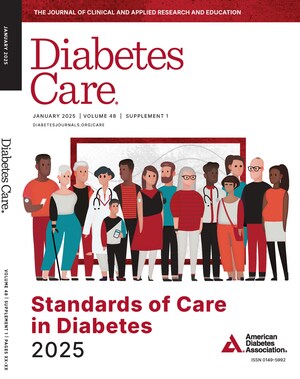NEW ORLEANS, June 13, 2016 /PRNewswire-USNewswire/ -- Liraglutide, a glucose-lowering drug, has been shown to safely and effectively lower the overall risk of heart attack, stroke or cardiovascular death among people with type 2 diabetes at high risk for cardiovascular disease, according to results from the Liraglutide Effect and Action in Diabetes – Evaluation of Cardiovascular Outcome Results (LEADER) trial. Additionally, there was a reduction in all-cause mortality and kidney disease. The study is being published in the New England Journal of Medicine (NEJM) concurrent with its presentation at the American Diabetes Association's 76th Scientific Sessions, Monday, June 13, 2016, in New Orleans.
In this randomized, double-blind study, 9,340 adults with type 2 diabetes at high risk for heart disease were assigned to either liraglutide (n=4,668) or placebo (n=4,672), and followed for an average of 3.8 years. Patients in the liraglutide arm received daily subcutaneous injections at an initial dose of 0.6 mg for the first week, 1.2 mg for the second week and up to 1.8 mg thereafter, based on tolerance. Participants, who were seen at 410 sites in 32 countries, had an average age of 64 years, were 64 percent male; and 73 percent (n=6,764) had prior cardiovascular disease.
Liraglutide is a long-acting, glucagon-like peptide-1 receptor agonist known to reduce blood glucose levels, blood pressure and weight. It is available to people with type 2 diabetes who have difficulty controlling blood glucose levels with a nutrition and exercise program alone. Participants in both arms of the trial took additional medications as needed to control their diabetes, high blood pressure, cholesterol levels and risk of complications.
Patients were assessed for clinical events, compliance with the study drug and other medication usage during visits at one, three and six months initially, then every six months for up to five years. (The average duration was 3.8 years, and the minimum duration was 3.5 years.) Blood tests, urine samples and electrocardiograms were taken at baseline and then annually for the duration of the patient's participation in the study. Blood (creatinine) and urine (protein) tests for diabetic kidney disease were obtained every six months.
Participants taking liraglutide experienced a 13 percent lower risk of time--to-first occurrence of cardiovascular death, non-fatal heart attack or non-fatal stroke, compared to those who were in the placebo group, which was the study's primary outcome. In addition, the study results demonstrated a 22 percent lower risk of cardiovascular mortality, a 15 percent lower risk of all-cause mortality and a 22 percent lower risk of new evidence of advanced diabetic kidney disease for patients in the liraglutide arm, compared to the placebo arm. No significant indications of safety issues were found among the patients in the liraglutide group.
"Our results should give patients and providers comfort that liraglutide can safely improve outcomes beyond the core treatment of type 2 diabetes," said lead investigator John B. Buse, MD, PhD, Verne S. Caviness Distinguished Professor, University of North Carolina School of Medicine, Chapel Hill. "In addition, liraglutide reduced the risk of the most serious complications associated with type 2 diabetes, including the risk of death. It is exciting to see such a broad-based benefit for patients who took liraglutide because most prior trials of diabetes medications have not shown such benefits."
The American Diabetes Association's 76th Scientific Sessions, to be held June 10-14, 2016, at the Ernest N. Morial Convention Center in New Orleans, is the world's largest scientific meeting focused on diabetes. The 2016 Scientific Sessions is expected to attract more than 16,000 attendees and offers researchers and health care professionals from around the world the opportunity to share ideas and learn about the significant advances in diabetes research, treatment and care. During the five-day meeting, attendees receive exclusive access to more than 2,500 original research presentations, participate in provocative and engaging exchanges with leading diabetes experts, and can earn Continuing Medical Education (CME) or Continuing Education (CE) credits for educational sessions. The program is grouped into eight theme areas: Acute and Chronic Complications; Behavioral Medicine, Clinical Nutrition, Education and Exercise; Clinical Diabetes/Therapeutics; Epidemiology/Genetics; Immunology/Transplantation; Insulin Action/Molecular Metabolism; Integrated Physiology/Obesity; and Islet Biology/Insulin Secretion. Margaret A. Powers, PhD, RD, CDE, President, Health Care & Education, will deliver her address on Saturday, June 11, and Desmond Schatz, MD, President, Medicine & Science, will present his address on Sunday, June 12. The top eight abstracts of this year's Scientific Sessions will be presented on Tuesday, June 14, in the Presidents Oral Session. In total, the 2016 Scientific Sessions includes 378 abstracts in 50 oral sessions, 2,021 poster presentations including 59 moderated poster discussions, and 335 published-only abstracts. The Association's 2016 Scientific Achievement Awards and Lectures are:
- Barbara B. Kahn, MD, Banting Medal for Scientific Achievement, the Association's highest honor. Kahn will deliver the Banting Medal Lecture, "Adipose Tissue, Inter-organ Communication, and the Path to T2D," on Sunday, June 12.
- Tamas L. Horvath, DVM, PhD, Outstanding Scientific Achievement Award (OSAA), will present his OSAA Lecture, "Hunger-promoting Hypothalamic Neurons Control System Metabolism and Drive Complex Behaviors and Longevity," on Monday, June 13.
- Sheri R. Colberg-Ochs, PhD, FACSM, Outstanding Diabetes Educator, will present her Lecture, "From Froot Loops® to Fitness—My Journey as an Educator and PWD," on Saturday, June 11.
- Edward W. Gregg, PhD, Kelly West Award for Outstanding Achievement in Epidemiology, will deliver his Lecture, "The Changing Tides of the Diabetes Epidemic—Smooth Sailing or Troubled Waters Ahead?," on Sunday, June 12.
Additional scientific research will be presented during 110 Symposia and nine Professional Interest Group sessions. The 76th Scientific Sessions also includes presence from more than 130 corporate and organizational exhibitors in nearly 100,000 square feet of exhibit space. Join the Scientific Sessions conversation on Twitter, #2016ADA.
About the American Diabetes Association
The American Diabetes Association is leading the fight to Stop Diabetes® and its deadly consequences and fighting for those affected by diabetes. The Association funds research to prevent, cure and manage diabetes; delivers services to hundreds of communities; provides objective and credible information; and gives voice to those denied their rights because of diabetes. Founded in 1940, the Association's mission is to prevent and cure diabetes, and to improve the lives of all people affected by diabetes. For more information, please call the American Diabetes Association at 1-800-DIABETES (1-800-342-2383) or visit diabetes.org. Information from both of these sources is available in English and Spanish. Find us on Facebook (American Diabetes Association), Twitter (@AmDiabetesAssn) and Instagram (@AmDiabetesAssn).
Logo - http://photos.prnewswire.com/prnh/20141105/156803LOGO
SOURCE American Diabetes Association
Related Links
WANT YOUR COMPANY'S NEWS FEATURED ON PRNEWSWIRE.COM?
Newsrooms &
Influencers
Digital Media
Outlets
Journalists
Opted In






Share this article